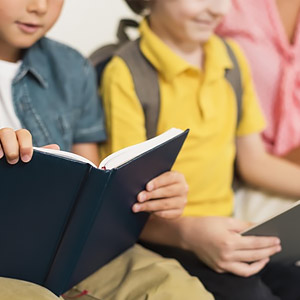

СДЕЛАЙТЕ СВОИ УРОКИ ЕЩЁ ЭФФЕКТИВНЕЕ, А ЖИЗНЬ СВОБОДНЕЕ
Благодаря готовым учебным материалам для работы в классе и дистанционно
Скидки до 50 % на комплекты
только до
Готовые ключевые этапы урока всегда будут у вас под рукой
Организационный момент
Проверка знаний
Объяснение материала
Закрепление изученного
Итоги урока

Glossary of terms (PBL).
Glossary of terms (PBL):
- Academic rigor — a criterion for project-based learning in which projects require higher-order thinking skills and research methods from academic and technical fields.
- Active exploration — a criterion for project-based learning in which projects extend beyond the classroom to involve work-based learning, community- based activities and technical labs.
- Adult relationships — a criterion for project-based learning in which projects involve adult mentors from the school and the community.
- Applied learning — a criterion for project-based learning in which projects require students to use academic and technical knowledge in acquiring the problem-solving, communication and teamwork skills they will need in the workplace.
- Assessment — a criterion for project-based learning in which projects include exhibitions and assessments of students’ work according to personal standards and performance standards set by the school and the community.
- Authenticity - 1) the project features real-world context, tasks and tools, quality standards, or impact – or speaks to students’ personal concerns, interests, and issues in their lives.
- Challenging Problem or Question - The project is framed by a meaningful problem to solve or a question to answer, at the appropriate level of challenge.
- Coherence - the quality of congruity between the teacher’s knowledge objectives, the learning activities and knowledge processes designed to achieve those objectives, and the outcomes and assessments designed to demonstrate student accomplishment of these objectives.
- Creative Thinking - a cognitive process of generating something new or unique that has value in a situation or context.
- Critical Thinking - a mental process of analyzing or evaluating information; a process of reflecting upon the meaning of statements, examining the offered evidence and reasoning, and forming judgments about the facts. Intellectual values associated with critical thinking include clarity, accuracy, precision, evidence, thoroughness and fairness.
- Critique and Revision - the project includes processes for students to give and receive feedback on the quality of their work, leading them to make revisions or conduct further inquiry.
- Curriculum- the agreed upon set of decisions about what students will learn (content), how they will demonstrate their learning (assessments), and key strategies, activities, and resources teachers will use to coach students to demonstrate the specified learning.
- Essential (driving) question - 1) project work is focused by an open-ended question that students understand and find intriguing, which captures their task or frames their exploration; 2) an open-ended question that sets the stage for higher-order thinking by encouraging students to investigate real-world solutions to a complex issue or problem.
- In-depth Inquiry - students are engaged in an extended, rigorous process of asking questions, using resources, and developing answers.
- Innovation - production or adoption, assimilation, and exploitation of a value-added novelty in economic and social spheres; renewal and enlargement of products, services, and markets; development of new methods of production; and establishment of new management systems.
- Inquiry - a process in which students follow a trail that begins with their own questions, leads to a search for resources and the discovery of answers, and which ultimately leads to generating new questions, testing ideas, and drawing their own conclusions.
- Key Knowledge, Understanding, and Success Skills - The project is focused on student learning goals, including standards-based content and skills such as critical thinking/problem solving, communication, collaboration, and self-management.
- Need-to-Know- students see the need to gain knowledge, understand concepts, and apply skills in order to answer the Driving Question and create project products.
- Performance - a tangible, observable set of actions by a student that can be used to determine extent and quality of student learning related to a specified outcome.
- Product - a tangible, observable artifact produced by a student that can be used to determine extent and quality of student learning related to a specified outcome; the end result of a project (a video, written report, advertising campaign, community action event, etc.) that students use to represent their work in the project’s culminating activity.
- Project– the development of confidence in using English in the real world, the world outside the classroom.
- Project-based learning (PBL) – 1) is an instructional approach built upon learning activities and real tasks that have brought challenges for students to solve; 2) a model for classroom activity that shifts away from the usual classroom practices of short, isolated, teacher-centered lessons; 3) a method of teaching that presents students with a problem or challenge to solve, requires them to gather information from various resources, and asks them to come up with an original solution that ends in a product or performance; 4) a systematic teaching method that engages students in learning important knowledge and 21st century skills through an extended student-influenced inquiry process structured around complex, authentic questions and carefully designed products and learning tasks; 5) a teaching strategy that uses real-world learning activities to engage student interest and motivation; 6) a dynamic approach to teaching in which students explore real-world problems and challenges, simultaneously developing 21stCentury skills while working in small collaborative groups.
- Project-based Learning approach - 1) A teaching method in which students gain knowledge and skills by working for an extended period of time to investigate and respond to a complex question, problem, or challenge; 2) an in-depth investigation of a real-world topic worthy of children’s attention and effort.
- Public Audience - students present their work to other people, beyond their classmates and teacher.
- Reflection - Students and teachers reflect on learning, the effectiveness of their inquiry and project activities, the quality of student work, obstacles and how to overcome them.
- Relevance - the application of knowledge in real-world situations, from predicable to unpredictable.
- Rubric - a criterion-based scoring guide that enables judges to make reliable judgments about student work and enables students to self-assess their performance.
- Significant Content - important knowledge and skills, derived from standards and key concepts at the heart of academic subjects.
- Voice and Choice - students are allowed to make some choices about the products to be created, how they work, and how they use their time, guided by the teacher and depending on age level and PBL experience.
- 21st Century Competencies - students build competencies valuable for today's world, such as problem solving, critical thinking, collaboration, communication, and creativity/innovation, which are explicitly taught and assessed.
- 21st century skills- 1) skills, abilities, and learning dispositions that have been identified as being required for success in 21st century society and workplaces by educators, business leaders, academics, and governmental agencies; 2) skills required for students to master in preparation for success in a rapidly changing, digital society; 3) skills associated with deeper learning, which is based on mastering skills such as analytic reasoning, creativity, critical thinking, complex problem solving, collaboration and communication.
References:
1. Brandon Goodman ESPY 505 Educational Psychology J. Stivers, Ph.D, Fall 2010
2. http://www.bie.org/about/what_pbl
3. https://quizlet.com/131633347/project-based-learning-terms-flash-cards/
4. https://www.edglossary.org/project-based-learning
5.http://sd62technologyresources.wikispaces.com/file/view/PBL+Design+and+Coaching+Guide.pdf
6. ›
7. http://www.webster-dictionary.net









